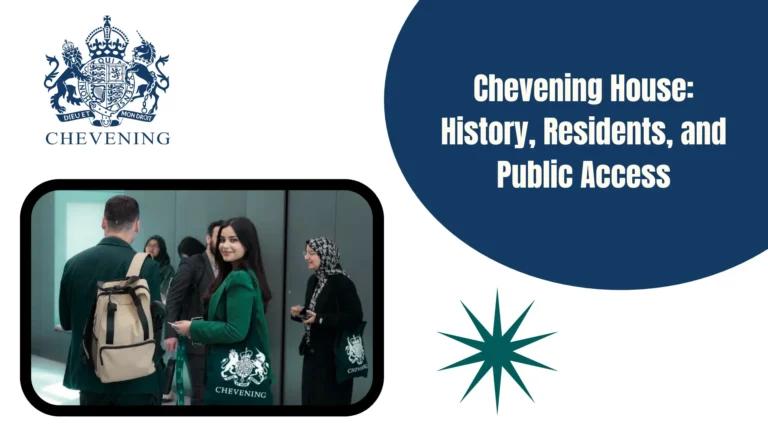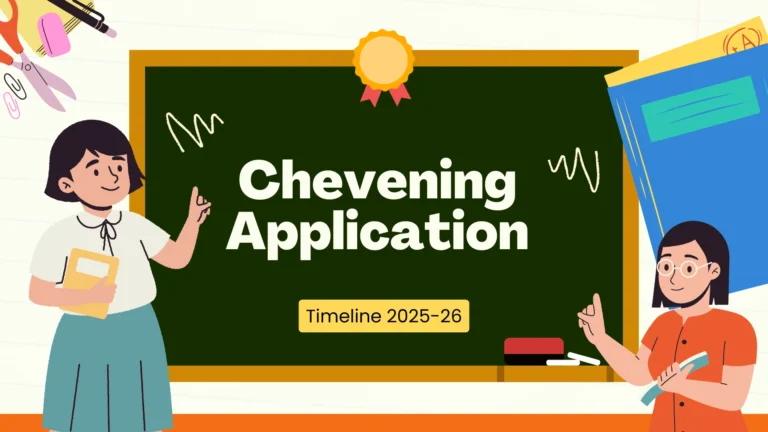Chevening Eligibility 2025: Your Complete Guide to Qualifying for the UK’s Premier Scholarship
There’s a special kind of heartbreak reserved for spending forty hours perfecting a scholarship application only to discover—right before hitting submit—that you never qualified in the first place.
I’ve seen it happen. Brilliant candidates who poured everything into their essays, secured glowing references, researched universities meticulously, only to realize at the eleventh hour that they needed 2,800 work hours and they only had 2,600. Or that their dual British citizenship made them ineligible. Or that their country wasn’t on the list.
Chevening eligibility 2025 isn’t the sexy part of the application. Nobody brags about meeting minimum requirements. But it’s the foundation. Get this wrong and nothing else matters.
So let’s make absolutely sure you qualify before you invest a single hour into this process.
The Five Core Chevening Eligibility Requirements
The Chevening scholarship eligibility criteria boils down to five non-negotiable requirements. All five. Not four out of five. Not “close enough.” All five.
1. Citizenship: Are You From an Eligible Country?
The rule: You must be a citizen of a Chevening-eligible country or territory.
What this means:
- You hold a passport from an eligible country
- You can prove your citizenship
- Your country has diplomatic relations with the UK
- Your country is on the official Chevening list
The Chevening country eligibility 2025 list includes 160+ countries and territories. Most nations worldwide qualify, but there are notable exceptions based on current diplomatic relations.
Who qualifies:
- Citizens of eligible countries (check official Chevening website)
- People who hold citizenship exclusively from eligible countries
- Those who can obtain passports from eligible countries
Who does NOT qualify:
- British citizens (sorry, this is for international development)
- Dual British citizens (even if other citizenship is eligible)
- Permanent residents of eligible countries without citizenship
- Refugees or stateless persons (some exceptions—see special section below)
The gray areas:
Dual citizenship (non-British): If you hold citizenship from two eligible countries, you’re fine. You just need to specify which country you’re representing and return there after your scholarship.
Recently changed citizenship: If you recently became a citizen of an eligible country (through naturalization, marriage, etc.), you must hold the passport before applying.
Pending citizenship: “I’m about to get citizenship” doesn’t count. You need to actually have it when you apply.
Country-Specific Notes
Chevening eligibility Pakistan 2025: Pakistani citizens are eligible and Pakistan receives a healthy allocation of scholarships. However, competition is fierce with thousands of qualified applicants.
Chevening eligibility India 2025: Indian citizens are eligible. India typically has one of the largest applicant pools, so strong applications are essential.
Chevening eligibility Nigeria 2025: Nigerian citizens are eligible with significant scholarship allocation due to historical UK-Nigeria ties.
2. Academic Qualification: Do You Have the Right Degree?
The requirement: An undergraduate degree that qualifies you for entry to a postgraduate program at a UK university.
In practical terms:
What qualifies:
- Bachelor’s degree (4 years typical)
- Bachelor’s honours degree (3 years in UK system)
- Equivalent qualifications recognized by UK universities
- Professional qualifications deemed equivalent to bachelor’s degree
Minimum grade: Generally, you need at least upper second-class honours (2:1) or equivalent. Some define this as:
- 60% or above
- 3.0+ GPA on a 4.0 scale
- First division
- “Good” or “Merit” classification
What complicates things:
Chevening undergraduate degree eligibility varies by education system. If your degree isn’t from UK, US, Canada, Australia, or similar systems, UK universities may require credential evaluation.
The grade equivalency challenge: What counts as “2:1 equivalent” differs by country. A 70% in Pakistan might equal a 2:1, while in the UK itself you’d need 60-69%.
Three-year vs. four-year degrees: Most UK universities accept both, but some competitive programs prefer four-year degrees or additional qualifications.
Professional qualifications: Engineering council certifications, medical degrees, law degrees—these typically qualify, but verify with specific universities.
What if you have a master’s already?
Chevening eligibility with master’s degree: You CAN apply if you already have a master’s degree, BUT:
- Your previous master’s must not have been funded by the UK government
- You must justify why you need another master’s
- You can’t pursue the same field unless there’s clear differentiation
- Your application needs stronger justification
The tricky situation: “I’m completing my bachelor’s now—can I apply?”
Yes, IF:
- You’ll have completed your degree before Chevening deadline
- You can provide transcripts and provisional certificates
- Your final grades meet requirements
- You can secure university offers based on pending completion
3. Work Experience: The 2,800-Hour Rule
This is where most confusion happens. Let’s demystify Chevening work experience eligibility 2025.
The specific requirement: 2,800 hours of work experience, which equates to approximately two years of full-time work.
What counts:
Paid employment:
- Full-time jobs
- Part-time jobs (hours add up cumulatively)
- Internships (paid or unpaid)
- Freelance or consulting work
- Contract work
Volunteer work:
- Structured volunteer positions with organizations
- Community service with documented hours
- NGO or charity work
- Board memberships with active roles
Self-employment:
- Business ownership
- Freelancing
- Consulting
- Entrepreneurship
The calculation:
Full-time work:
- 40 hours/week × 52 weeks × 2 years = 4,160 hours (exceeds requirement)
- If you worked 2 years full-time, you definitely qualify
Part-time work:
- 20 hours/week × 52 weeks × 3 years = 3,120 hours (qualifies)
- Must track actual hours worked
Mixed experience:
- 1 year full-time (2,080 hours) + 1 year part-time 15 hours/week (780 hours) = 2,860 hours (qualifies)
What does NOT count:
During full-time studies: Part-time work during undergraduate or master’s studies generally doesn’t count unless:
- It was substantial (20+ hours/week consistently)
- It can be documented
- It wasn’t just summer work
Unpaid family business help: Unless you had a formal role with documented hours, helping in the family shop doesn’t count.
Academic projects or coursework: University assignments, thesis work, research as part of your degree—these are education, not work experience.
Very casual work: Occasional babysitting, tutoring a few hours a month, sporadic freelance projects—these are hard to document and likely don’t add up to much.
The documentation requirement:
You must be able to prove your work experience with:
- Employment letters
- Contracts
- Pay stubs
- Letters from organizations (for volunteer work)
- References from supervisors
Can you apply without work experience?
Chevening eligibility without work experience: No. The 2,800-hour requirement is non-negotiable. If you’re short, you need to:
- Wait and gain more experience
- Count all eligible experience you might have overlooked
- Apply next year when you qualify
The gray area—recent graduates:
If you graduated last year and have been working since, you might be close. Calculate carefully. Include:
- Any substantial part-time work during final university year
- Summer internships
- Post-graduation employment
- Volunteer work
4. University Offers: The Three-Course Requirement
The requirement: You must apply to three different UK universities for three different eligible master’s courses, and receive at least one unconditional offer by the deadline.
Breaking this down:
Three different universities: Not three courses at Oxford. Not University of London (which has multiple colleges—pick different ones). Three entirely separate institutions.
Three different courses: They can be in the same field but must be different programs with different titles at different universities.
Eligible courses:
- Must be on Chevening’s eligible course list
- Usually one-year master’s programs
- Starting in autumn 2025
- At recognized UK universities
At least one unconditional offer: By the deadline specified in your award (typically July-August), you must have at least one unconditional offer. Conditional offers are fine initially, but you must convert at least one.
Why this is critical: You can win the Chevening scholarship but lose it if you don’t secure university admission. The scholarship funds your education—if you can’t get admitted, there’s nothing to fund.
5. Return Home Requirement: The Two-Year Commitment
The rule: You must return to your country of citizenship for a minimum of two years after your scholarship ends.
Chevening return home requirement 2025 is contractual. This isn’t a suggestion—it’s a legal obligation.
What this means:
You must:
- Return within a month of course completion
- Stay in your home country for at least 24 months
- Work or pursue activities in your home country
- Maintain your primary residence there
You cannot:
- Stay in the UK after completing your course (beyond short visa extensions)
- Relocate to a third country immediately after
- “Visit” your home country briefly then leave again
Exceptions: Very limited. Medical emergencies, serious family situations—but you’d need approval and documentation.
Why it matters: Chevening invests in you expecting you’ll return home and create impact. Violating this can require full scholarship repayment and bar you from future UK government opportunities.
The mindset: Don’t apply for Chevening if your goal is UK immigration. There are other pathways for that. Chevening is about returning home as a stronger leader.
Special Circumstances and Edge Cases
Chevening Eligibility for Refugees 2025
Stateless persons and refugees face unique challenges:
Generally: You must hold citizenship from an eligible country. However:
- Some countries have special provisions
- British Council in your location may offer guidance
- You’ll need to demonstrate strong ties to a country you’ll return to
Contact the Chevening team directly if you’re in this situation. They handle case-by-case.
UK Citizens and Permanent Residents
Chevening scholarship eligibility UK citizens: Not eligible. This includes:
- British citizens by birth
- Naturalized British citizens
- British Overseas Territories citizens
- Dual citizens where one citizenship is British
UK permanent residents: Not eligible either, unless you also hold citizenship from an eligible country and you’ll be representing that country.
Age Limits
Chevening scholarship age eligibility 2025: There is NO upper age limit. Whether you’re 23 or 43 or 63, if you meet all other criteria, you can apply.
Minimum age: You must be at least 18 years old when you apply (which means born before the application deadline).
English Language Requirements
Chevening English language eligibility 2025: Chevening itself doesn’t set English requirements, but UK universities do.
What you’ll typically need:
- IELTS: Overall 6.5-7.0 (varies by university)
- TOEFL: 90-100+ (varies by university)
- Other tests: PTE, Cambridge English, etc.
Exemptions: If your undergraduate degree was taught entirely in English at a recognized institution, many universities waive the test requirement.
Strategy: Take the test early. Don’t wait until you win Chevening—you need scores for university applications.
Eligibility Updates and Changes for 2025
Chevening eligibility criteria update 2025:
While core requirements remain stable, always check the official website for:
- Changes to eligible countries list (diplomatic relations shift)
- Updated work experience documentation requirements
- New eligible courses or universities
- Any policy adjustments
Recent clarifications:
- Work experience calculation methods
- What qualifies as “equivalent” degrees
- Documentation requirements for various circumstances
Your Eligibility Verification Checklist
Chevening eligibility requirements checklist:
□ Citizenship
- I hold citizenship from an eligible Chevening country
- I am NOT a British citizen or dual British citizen
- I can provide passport as proof
□ Education
- I have a bachelor’s degree or equivalent
- My degree qualifies me for UK postgraduate admission
- My grades meet minimum requirements (2:1 or equivalent)
- I have official transcripts available
□ Work Experience
- I have at least 2,800 hours of qualifying work experience
- I can document all of this experience
- My experience meets Chevening definitions
- I have employment letters or references available
□ University Applications
- I can identify three eligible UK universities
- I can apply to three different courses
- I meet entry requirements for these courses
- I can secure at least one unconditional offer by deadline
□ Return Commitment
- I am willing and able to return home for two years
- I understand this is legally binding
- My career plans involve returning home
- I’m not using Chevening for immigration purposes
□ Additional Requirements
- I have not previously studied in UK with UK government funding
- I am not an employee of HMG or British diplomatic missions
- I am not a relative of HMG employees
- I meet English language requirements for my chosen universities
What If You’re Almost Eligible?
Scenario 1: “I have 2,600 hours of work experience”
Options:
- Wait and apply next year when you’ll have enough hours
- Carefully review ALL your experiences—you might have overlooked volunteer work or part-time roles that add up
- Don’t fudge numbers—they verify this
Scenario 2: “I’ll graduate in 3 months”
You can apply IF:
- You’ll complete degree before the application deadline
- You can get provisional documentation
- Your university will confirm your expected classification
- You can demonstrate to UK universities you’ll meet requirements
Scenario 3: “My country isn’t on the list”
Unfortunately: Wait and hope diplomatic relations change, or explore other scholarship opportunities. Chevening eligibility is tied to diplomatic relationships.
Scenario 4: “I’m a dual British-Pakistani citizen”
Sadly: Not eligible. Even if your second citizenship is from an eligible country, holding British citizenship disqualifies you.
Common Eligibility Mistakes
Why applications get rejected on eligibility:
1. Citizenship confusion: Assuming permanent residency equals citizenship. It doesn’t.
2. Work experience miscalculation: Counting hours that don’t qualify, or overestimating part-time work.
3. Incomplete documentation: Unable to prove work experience claims when asked.
4. Academic requirement misunderstanding: Thinking a diploma or certificate equals a bachelor’s degree.
5. UK immigration intentions: Application makes it clear they plan to stay in UK after, not return home.
Take the Eligibility Test
Many people find it helpful to use a Chevening eligibility quiz to verify they qualify. While this article covers everything, quick yes/no questions can help:
Quick Self-Assessment:
- Are you a citizen (not just resident) of a Chevening-eligible country? YES/NO
- Do you hold British citizenship or dual British citizenship? YES/NO (NO qualifies you)
- Do you have a bachelor’s degree or equivalent? YES/NO
- Do you have at least 2,800 hours of work experience? YES/NO
- Can you apply to three different UK universities? YES/NO
- Are you willing to return home for two years minimum? YES/NO
- Can you start a master’s in September/October 2025? YES/NO
If you answered YES to questions 1, 3-7 and NO to question 2: You’re eligible!
Any other combination: Review the specific requirement you don’t meet.
Final Thoughts: Eligibility as Your Foundation
Understanding Chevening eligibility 2025 isn’t glamorous. Nobody includes “verified my eligibility” in their success story. But it’s essential.
The truth: Chevening receives 60,000+ applications for 1,500 scholarships. They don’t have time to be flexible with eligibility requirements. You either qualify or you don’t.
The good news: If you qualify, you’re in the game. Your eligibility doesn’t determine whether you win—your leadership, your vision, your application quality does that. But eligibility gets you through the door.
So verify carefully:
- Check your citizenship status
- Calculate your work hours precisely
- Confirm your degree equivalency
- Plan your university applications
- Understand the return commitment
Then, and only then, move forward with confidence.
Because there’s nothing worse than realizing—after forty hours of work—that you never qualified in the first place.
And there’s nothing better than clicking “submit” knowing you absolutely, definitely, unquestionably meet every single requirement.
You’ve got this. Now go verify your eligibility, and then let’s get that application written.
Ready to proceed? If you meet all eligibility requirements, check out our comprehensive application guide, essay writing tips, and interview preparation resources. Your Chevening journey starts with eligibility—but it doesn’t end there.







